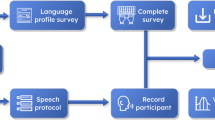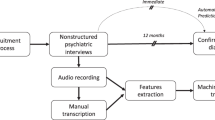Abstract
In this paper, we describe the challenges of collecting data in the Māori population for automatic detection of schizophrenia using natural language processing (NLP). Existing psychometric tools for detecting are wide ranging and do not meet the health needs of indigenous persons considered at risk of developing psychosis and/or schizophrenia. Automated methods using NLP have been developed to detect psychosis and schizophrenia but lack cultural nuance in their designs. Research incorporating the cultural aspects relevant to indigenous communities is lacking in the design of existing automatic prediction tools and one of the main reasons is the scarcity of data from indigenous populations. This paper explores the current design of the New Zealand health care system and its potential impacts on access and inequities in the Māori population and details the methodology used to collect speech samples of Māori at risk of developing psychosis and schizophrenia. The paper also describes the major obstacles faced during speech data collection, key findings, and probable solutions.

Similar content being viewed by others
Data availability
The datasets for this study will be made on reasonable request.
Notes
A town located in the North Island of New Zealand.
References
Adewuya OA, Adewuya AO (2006) Predictability of speech and language in Nigerian patients with psychosis: a controlled study. Psychiatry Res 143(2–3):199–204
Bedi G, Carrillo F, Cecchi GA, Slezak DF, Sigman M, Mota NB, Corcoran CM (2015) Automated analysis of free speech predicts psychosis onset in high-risk youths. NPJ Schizophr 1(1):1–7
Belenguer L (2022) AI bias: exploring discriminatory algorithmic decision-making models and the application of possible machine-centric solutions adapted from the pharmaceutical industry. AI Ethics 2(4):771–787
Bennett ST, Liu JH (2018) Historical trajectories for reclaiming an indigenous identity in mental health interventions for Aotearoa/New Zealand—Māori values, biculturalism, and multiculturalism. Int J Intercult Relat 62:93–102
Berryman M, Eley E, Copeland D (2017) Listening and learning from rangatahi Māori: the voices of Māori youth. Crit Quest Educ 8(4):476–494
Bolukbasi T, Chang KW, Zou J, Saligrama V, Kalai A (2016) Man is to computer programmer as woman is to home-maker? De-biasing word embeddings. Adv Neural Inf Process Syst 29
Came HA, Herbert S, McCreanor T (2019) Representations of Māori in colonial health policy in Aotearoa from 2006–2016: a barrier to the pursuit of health equity. Crit Public Health 31(3):1–11
Christopher S, Saha R, Lachapelle P, Jennings D, Colclough Y, Cooper C, Webster L (2011) Applying indigenous community-based participatory research principles to partnership development in health disparities research. Fam Community Health 34(3):246
Cohen AS, Elvevåg B (2014) Automated computerized analysis of speech in psychiatric disorders. Curr Opin Psychiatry 27(3):203
Corcoran CM, Carrillo F, Fernández-Slezak D, Bedi G, Klim C, Javitt DC, Cecchi GA (2018) Prediction of psychosis across protocols and risk cohorts using automated language analysis. World Psychiatry 17(1):67–75
de Fine Licht K, de Fine Licht J (2020) Artificial intelligence, transparency, and public decision-making. AI Soc 35:917–926
Durie M (2004) An indigenous model of health promotion. Health Promot J Austr 15(3):181–185
Elvevåg B, Foltz PW, Rosenstein M, DeLisi LE (2010) An automated method to analyze language use in patients with schizophrenia and their first-degree relatives. J Neurolinguistics 23(3):270–284
Farnbach S, Gee G, Eades AM, Evans JR, Fernando J, Hammond B, Sims M, DeMasi K, Glozier N, Hackett ML (2020) What are the resourcing requirements for an Aboriginal and Torres Strait Islander primary health care research project? Public Health Res Pract 30(3):29341911
Fogarty W, Bulloch H, McDonnell S, Davis M (2018) Deficit discourse and indigenous health. Lowitja Institute
Groot S, Le Grice J, Nikora L (2018) Indigenous psychology in New Zealand. In: Wen Li W, Hodgetts D, Hean Foo K (eds) Asia-Pacific perspectives on intercultural psychology. Routledge, London, pp 198–217
Gumbsch T, Borgwardt K (2021) Ethnicity-based bias in clinical severity scores. Lancet Digital Health 3(4):e209–e210
Hamley L, Le Grice J (2021) He kākano ahau—identity, indigeneity and wellbeing for young Māori (indigenous) men in Aotearoa/New Zealand. Fem Psychol 31(1):62–80
Hamley L, Le Grice J, Greaves L, Groot S, Lindsay Latimer C, Renfrew L, Clark TC (2022) Te Tapatoru: a model of whanaungatanga to support rangatahi wellbeing. Kōtuitui N Zeal J Soc Sci. https://doi.org/10.1080/1177083X.2022.2109492
Harris R, Cormack D, Stanley J, Curtis E, Jones R, Lacey C (2018) Ethnic bias and clinical decision-making among New Zealand medical students: an observational study. BMC Med Educ 18:1–11
Hughes G W (1981) Neuropsychiatric aspects of bilingualism. A brief review. Br J Psychiatry 139(1):25–28. https://doi.org/10.1192/bjp.139.1.25
Janca A, Bullen C (2003) The Aboriginal concept of time and its mental health implications. Australas Psychiatry 11(1):40–44
Jongsma HE, Karlsen S, Kirkbride JB, Jones PB (2021) Understanding the excess psychosis risk in ethnic minorities: the impact of structure and identity. Soc Psychiatry Psychiatr Epidemiol 56(11):1913–1921
Kingi TK, Durie M (2001) Hua Oranga: a Māori mental health outcome measure
Kostick-Quenet KM, Cohen IG, Gerke S, Lo B, Antaki J, Movahedi F, Blumenthal-Barby JS (2022) Mitigating racial bias in machine learning. J Law Med Ethics 50(1):92–100
Kumari S, Malik M, Florival C, Manalai P, Sonje S (2017) An assessment of five (PANSS, SAPS, SANS, NSA-16, CGI-SCH) commonly used symptoms rating scales in schizophrenia and comparison to newer scales (CAINS, BNSS). J Addict Res Ther. https://doi.org/10.4172/2155-6105.1000324
Mamah D, Musau A, Mutiso VN, Owoso A, Abdallah AB, Cottler LB, Ndetei DM (2016) Characterizing psychosis risk traits in Africa: a longitudinal study of Kenyan adolescents. Schizophr Res 176(2–3):340–348
Marinucci L, Mazzuca C, Gangemi A (2022) Exposing implicit biases and stereotypes in human and artificial intelligence: state of the art and challenges with a focus on gender. AI Soc. https://doi.org/10.1007/s00146-022-01474-3
McLean D, Barrett R, Loa P, Thara R, John S, McGrath J, Mowry B (2015) Comparing schizophrenia symptoms in the Iban of Sarawak with other populations to elucidate clinical heterogeneity. Asia Pac Psychiatry 7(1):36–44
Mete L, Schnurr PP, Rosenberg SD, Oxman TE, Doganer I, Sorias S (1993) Language content and schizophrenia in acute phase Turkish patients. Soc Psychiatry Psychiatr Epidemiol 28:275–280
Mooney H (2013) Māori social work views and practices of rapport building with rangatahi Māori. Aotearoa NZ Soc Work 24(3/4):49–64
Morice RD, Ingram JC (1982) Language analysis in schizophrenia: Diagnostic implications. Aust NZ J Psychiatry 16(2):11–21
Mrklas KJ, Boyd JM, Shergill S, Merali S, Khan M, Nowell L, Graham ID (2023) Tools for assessing health research partnership outcomes and impacts: a systematic review. Health Res Policy Syst 21(1):3
Munn L (2023) The five tests: designing and evaluating AI according to indigenous Māori principles. AI Soc. https://doi.org/10.1007/s00146-023-01636-x
Nelson A (2002) Unequal treatment: confronting racial and ethnic disparities in health care. J Natl Med Assoc 94(8):666
Noel-Jorand MC, Reinert M, Giudicelli S, Dassa D (1997) A new approach to discourse analysis in psychiatry, applied to a schizophrenic patient’s speech. Schizophr Res 25(3):183–198
Obermeyer Z, Powers B, Vogeli C, Mullainathan S (2019) Dissecting racial bias in an algorithm used to manage the health of populations. Science 366(6464):447–453
Oliver D, Kotlicka-Antczak M, Minichino A, Spada G, McGuire P, Fusar-Poli P (2018) Meta-analytical prognostic accuracy of the Comprehensive Assessment of at Risk Mental States (CAARMS): the need for refined prediction. Eur Psychiatry 49:62–68
Palaniyappan L (2021) More than a biomarker: could language be a biosocial marker of psychosis? NPJ Schizophr 7(1):42
Ratana R, Sharifzadeh H, Krishnan J, Pang S (2019) A comprehensive review of computational methods for automatic prediction of schizophrenia with insight into indigenous populations. Front Psych 10:659
Russell L, Smiler K, Stace H (2013) Improving Māori health and reducing inequalities between Māori and non-Māori: has the primary health care strategy worked for Māori. New Zealand: Health Research Council of New Zealand and the Ministry Of Health Wellington
Sadler H (2007) Mātauranga Māori (Māori epistemology). Int J Humanit. https://doi.org/10.18848/1447-9508/CGP/v04i10/58246
Seeman MV (2016) Bilingualism and schizophrenia. World J Psychiatry 6(2):192
Taitimu M (2008) Ngā whakawhitinga: standing at the cross roads: Māori ways of understanding extra-ordinary experiences and schizophrenia (Doctoral dissertation, ResearchSpace@Auckland)
Terrazas-Carrillo E (2017) Psychopathology and bilingualism. Psychology of Bilingualism: The Cognitive and Emotional World of Bilinguals, 227–258
Toppelberg CO (1996) Psychiatric evaluation in a second language. Psychiatr Serv. https://doi.org/10.1176/ps.47.9.1001-b
Walter M (2005) Using the 'power of the data' within Indigenous research practice. Aust Aborig Stud 2:27–34
Westerman T (2003) Development of an inventory to assess the moderating effects of cultural resilience with Aboriginal youth at risk of depression, anxiety and suicidal behaviours (Doctoral dissertation, Curtin University of Technology.)
Wilson C (2001) Decolonizing methodologies: research and indigenous peoples. Soc Policy J N Zeal 214–218
Woodroffe T (2021) Presentation feedback as an Indigenous methodology. Aust J Educ 65(1):73–83
World Health Organization (2022) New Zealand: health system review
Xu S, Yang Z, Chakraborty D, Tahir Y, Maszczyk T, Chua VYH, Keong JLC (2018) Automatic verbal analysis of interviews with schizophrenic patients. In 2018 IEEE 23rd International Conference on Digital Signal Processing (DSP) (pp. 1–5). IEEE
Yang L, Chen S, Chen CM, Khan F, Forchelli G, Javitt DC (2012) Schizophrenia, culture and neuropsychology: sensory deficits, language impairments and social functioning in Chinese-speaking schizophrenia patients. Psychol Med 42(7):1485–1494
Zandi T, Havenaar JM, Limburg-Okken AG, Van Es H, Sidali S, Kadri N, Kahn RS (2008) The need for culture sensitive diagnostic procedures: a study among psychotic patients in Morocco. Soc Psychiatry Psychiatr Epidemiol 43:244–250
Funding
UNITEC.
Author information
Authors and Affiliations
Corresponding author
Ethics declarations
Conflict of interest
The authors declare that the research was conducted in the absence of any commercial or financial relationships that could be construed as a potential conflict of interest.
Additional information
Publisher's Note
Springer Nature remains neutral with regard to jurisdictional claims in published maps and institutional affiliations.
Rights and permissions
Springer Nature or its licensor (e.g. a society or other partner) holds exclusive rights to this article under a publishing agreement with the author(s) or other rightsholder(s); author self-archiving of the accepted manuscript version of this article is solely governed by the terms of such publishing agreement and applicable law.
About this article
Cite this article
Ratana, R., Sharifzadeh, H. & Krishnan, J. Considerations for collecting data in Māori population for automatic detection of schizophrenia using natural language processing: a New Zealand experience. AI & Soc (2023). https://doi.org/10.1007/s00146-023-01700-6
Received:
Accepted:
Published:
DOI: https://doi.org/10.1007/s00146-023-01700-6




